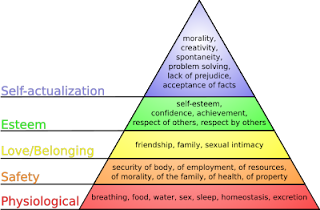
There have been criticisms of his theory questioning whether a hierarchy exists. [2] There have been others who question the ability of true economic security which would then invalidate the Safety need of the model because people can achieve higher level needs without economic security being met.
”Our fear of losing our economic safety is what prevents us from taking risks and risk taking is what leads to economic growth which is the foundation for reaching the top of Maslow’s pyramid. Most of us don’t want wealth, just to have wealth. We want the secure feeling we think wealth will give us. Once we have that feeling we believe we will spend our time doing things we love rather than worrying about money. But you’ll never get there unless you risk your economic security. You have to act in spite of your fear. It is an undeniable fact that you cannot increase the size of the economic pie without risk. To create more wealth, you must trade in your current habits and actions for ones that will be more productive, but since you can’t predict the future you can’t be sure your plan will work… The need for economic security appears to be the only need in Maslow’s Hierarchy that is in direct conflict with reaching the next level. Fear of losing what we are prevents us from becoming what we want to be.”[3]
Economic security is a function of perception. We all have varying perceived levels of “what is enough” at any given time. Some people are happy and perceive economic security when they can pay their bills and live comfortably (comfort is also a perceived level based on one’s previous experiences).
Then there are those who might argue that economic security is never achieved because human nature drives some people to always want more and therefore they are never satisfied or content. This drive for more, more, more can have a blinding effect on what’s best for all concerned and therefore have a ripple effect on more people than just those in direct contact with the person.
Generally speaking, I believe most people would agree with Maslow’s theory. If you are worried about the basics of life, it is difficult to even consider higher needs and aspirations. Therefore, it becomes a function of limited time to achieve a prioritized level of needs. Priority can also be an individual perception based on physical needs and mental stability. If you are thirsty and dehydrated, water is imperative. If you are hungry, you need food. If the storm is coming or the bullets are flying, shelter is first.
When you throw mental attitude into the mix it can all become self-prophecy. If you have a negative attitude toward your situation the outcome will be minimal at best. A positive attitude, on the other hand, can give you hope, strength to meet the challenge and the drive to achieve a higher level.
So what happens once you are beyond the basics of life – food, water, air, shelter, health?
[1] http://en.wikipedia.org/wiki/Maslow%27s_hierarchy_of_needs#cite_ref-8
[2] Wahba, A; Bridgewell, L (1976). "Maslow reconsidered: A review of research on the need hierarchy theory". Organizational Behavior and Human Performance (15): 212–240.
[3] http://www.steve-olson.com/the-paradox-in-maslow%E2%80%99s-hierarchy-of-needs/
Monday, January 26, 2009
Maslow’s Hierarchy of Needs in Today’s Economic World
Abraham Maslow (1908-1970) was an American psychologist born in Brooklyn. He is best known for his concept of hierarchal needs which he proposed in a paper in 1943. His theory was that lower level basic physical needs must be met before a person can attend to higher level needs. This is an interesting concept when you realize this theory was introduced during World War II when life got down to the basics for much of the world. (See diagram.[1]) (Love/Belonging is also noted as Social needs.)
Labels:
basic needs,
economics,
economy,
hierarchy,
Maslow,
physical needs,
psychological needs
Subscribe to:
Post Comments (Atom)

No comments:
Post a Comment